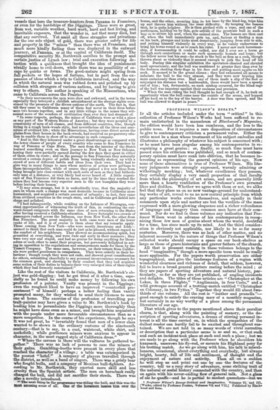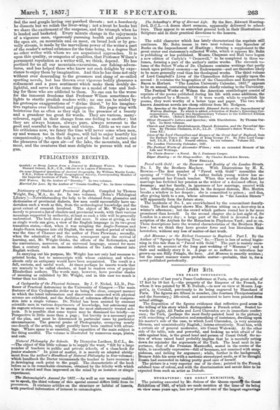PROFESSOR WILSON'S ESSAYS. * Ir all the articles included under the
term " critical" in this collection of Professor Wilson's Works had been suffered to remain undisturbed in the mausoleum of Blackwood's Magazine the edition would have been less cumbrous, and the loss to the public none. For it requires a rare disposition of circumstances to give to contemporary criticism a permanent value. Either the critic must be a man whose treatment of his subject embodies and illustrates a philosophy of whatever his subject is concerned with; or he must have been singular among his contemporaries in recognizing a great genius ; or, finally, so much time must have passed since his criticism was published, and so much of contemporary opinion must have sunk into oblivion, that he becomes interesting as representing the general opinions of his age. Now none of these alternatives is true of Professor Wilson. His literary judgments were strongly expressed, warmly admiring or witheringly mocking ; but, whatever excellences they possess, they certainly display a very small proportion of that faculty from which the philosophy of art arises, and are generally little more than a hearty ventilation of the Professor's own personal likes and dislikes. 'Whether we agree with them or not, we alike feel that they place us on no new vantage-ground for understanding works of art, reveal to us no new central principle from which any particular works evolve themselves, and. equally in their comments upon style and matter are but the verdicts of the mass expressed with a more glowing eloquence and a richer redundance of language and imagery than common men have at their command. Nor do we find in these volumes any indication that Professor Wilson went in advance of his contemporaries in recognizing those few men of genius about whom the world, doubtful for a time, has since made up its mind. And the third consideration is obviously not applicable, nor likely to be so for many centuries. Moreover' there was no lack of other matter' and no inherent necessity in the nature of things that Professor Wilson's collected works should occupy a space on our book-shelves as large as those of grave historians and graver fathers of the church. All that is pleasant reading in these volumes belongs to the head "imaginative," though a more specific term would be really more applicable. For the papers worth preservation are either topographical, and give the landscape features of a region with wonderful clearness and richness of detail, that seldom, however, fail to leave a broad general picture resting before the mind ; or they are papers of sporting adventure and natural history, particularly, so far as they are yet published, of angling incidents and delights. The titles of these articles are "Christopher at the Lakes, in three Flights," " Anglimania, in four Casts," and a wild grotesque account of a trotting-match entitled "Christopher on Colonsay, in two Fyttes." Together they would fill about twothirds of one volume. All the rest is "leather and prunella "good enough to satisfy the craving maw of a monthly magazine, but certainly in no way 'worthy of a place among the permanent literature of our age.
That which gives to the papers mentioned above their peculiar charm, is that, along with the painting of scenery, or the description of sporting adventures, a drama of stirring personal interest is all the time carried on, in which the sympathies of the dullest reader can hardly fail to be excited and throughout sustained. We are not told in so many words of vivid narrative or description that a particular scene is so and -so, or that such and such an incident took place at such and such a place ; but we are made to go along with the Professor when he shoulders his knapsack, unscrews his fly-rod, or mounts his Highland pony for his trotting match. As we go along with him, his talk is miscellaneous, occasional, about everything and everybody, but always bright, hearty, full of life and sentiment, of thought and the enjoyment of nature and activity. Then all on a sudden he will stop us and point out one by one the features of the country, tell us a racy story of adventure, some striking trait of the natural or social history connected with the country, and then on again with his never-ending flow of general talk. Not a glass of ale he quaffs—and he is partial to modest quenchers—but we • Professor Wilson's Eatery! Critical and linaginatire. Volumes II. and III. [Worka, edited by Professor Ferrier, Volumes VI, sod VII.] Published by Blacks wood and Sons. feel the cool gurgle laving our parched throats ; not a hatorletedy he dissects but we relish the liver-wing; not a trout he hooks but we share the excitement of the suspense, and the triumph when he is landed and basketed. Every minute change in the enjoyments of a vigorous man, vigorously pursuing health and pleasure in the open air, on mountain and on moor, on broad loch or by gravelly stream, is made by the marvellous power of the writer a part of the reader's actual existence for the time being, to a degree that no other writer with whom we are acquainted approaches. It is upon this quality, or congeries of qualities, that Professor Wilson's permanent reputation as a writer will, we think, de nd. He has poetized for us all our mountain-excursions, our -adventures, and has helped those who know not such delights y experience to enjoythem by imagination. And this he has done not only without ever descending to the grossness and slang of so-called sporting novels, but has thrown over vigorous bodily pleasures a refinement and a pure sentiment which make them doubly delightful, and serve at the same time as a model of tone and feeling for those who are addicted to them. No one can be the worse for the innocent freedoms that Professor Wilson sometimes delights to startle prudish readers with ; no one can be misled by Ins grotesque exaggerations of "divine thirst," by his imaginative raptures over Glenlivet and pigeon-pie. His pages ring with boisterous fun as often as they sigh in the presence of a 'beauty and a grandeur too great for words. They are various, manycoloured., rapid in their change from one feeling to another; but they are always human, always pure, always reverent to the good and scornful to the mean and vicious. Little as we care for his criticisms now, we fancy the time will never come when men, ay and women too in their degree, will fail to enjoy heartily his companionship ; when the talk is not of books but of nature and the pleasures of the open air—of the lake, the mountain, and the moor, and the creatures that man delights to pursue with rod or Kan.



























 Previous page
Previous page